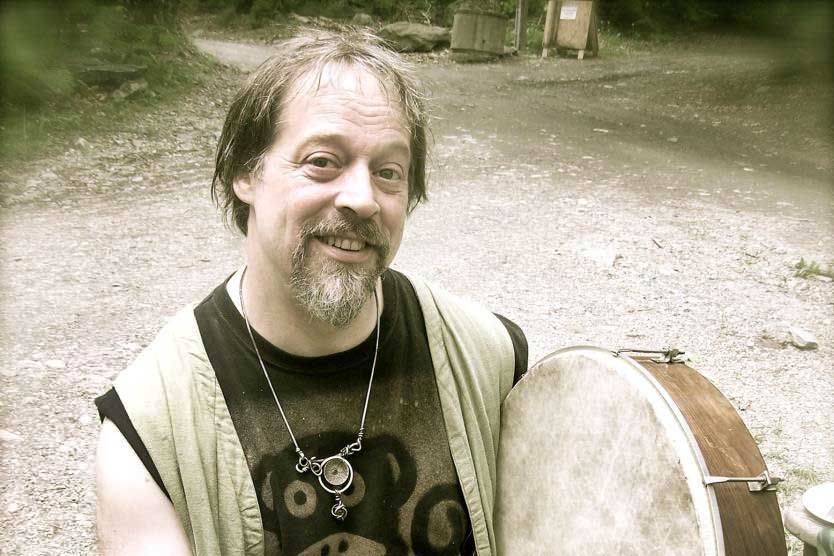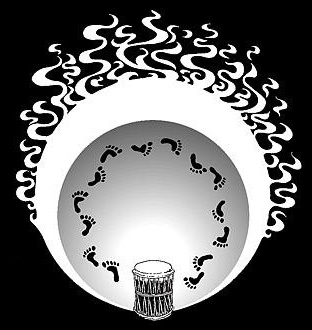
Bill Thorpe Interview
By Michael Plunkett
March 2000
Bill Thorpe is a second generation Irish-American citizen. His grandfather and siblings came to the country in the forties and his family was always steeped in the tradition of Celtic music, thriving in the fifties in the rich New York Irish ceili scene. His family has traveled the globe studying music, with many returning to the Celtic form.
Two of his uncles returned from study in Africa to form the band Celtic Thunder. He now lives and performs the Irish bodhran in New York while making games, music and "mystic fun". Mr. Thorpe is a metalsmith as well. This interview was conducted on 3/27/00, recorded over the telephone.
How was it that you came to Celtic music? Your family seems to be a guiding force.
Essentially at first. My brother and I were exposed all through our growing up to college radio. We got a lot of east Indian music and strange radio theatre and a lot of good Irish music coming through from the college airways. Between that and our family we built up a great love of the Irish musical tradition. I originally wanted to study drums. I didn't find I had the discipline for studying on the pad for a year before getting my drum kit, and abandoned it. When I was a teenager I was exposed to the bodhran from my uncles, and the first time I worked on it, after about forty five minutes, I had the knack and I knew that it was the drum for me.
Are you exclusively a bodhran player?
Essentially, as percussionist I do a number of different things but I do not consider myself a drummer-I consider myself a bodhran player. My recognition has been from being a fairly inventive and skilled bodhran player. I used to think I had no skill at the drum because I used to think I had no rhythm. And after examining it I went, "wait a minute, I'm a fine musician and a fine dancer". I have a very good sense of rhythm! But I don't have a very good sense of left/right coordination for some reason. And the thing about the bodhran is that essentially all of the percussion work (hitting something with something else) is done with one hand. The tonal work, the subtleties, the melody work is done with the other hand, much like playing a stringed instrument.
I've heard that the word bodhran means "dull thud" and a lot of the activity isn't tremendously tonal. How many sounds do you think you bring from that drum?
Yes! It's very interesting that you ask that and it's very important that you bring that up. In the first place, the tradition of the bodhran comes as a skin sieve for winnowing grain, and it's true that the word means "deadened sound," and how the bodhran is traditionally played among the Irish is with one hand, the left, behind the bars, and when you play against a goatskin you get a variety of different sounds that have been muted. Now understand that that does not mean that there is no tonal quality, but that the percussive force has been dulled and muted. Now the other hand is doing a lot of work bending the skins. The other thing is that, if you go to a place like west Africa and you have music that is based on the rhythmic pulse, you have a whole orchestra of drums. You go to Ireland they have one frickin' drum. Frankly, what they're looking for is someone to keep the pulse for jigs, reels, and dance music. So in traditional Irish music, there is not a lot of fancy bodhran playing. Now understand that I'm not a traditional player. I've been taught by a traditional master of the skin but I think each bodhran player should play with their own flavor and approach. My own is very melodic and I don't deaden the sound a lot though I do bend it. I'm doing what many Irish musicians call following the tune, not the rhythm. I want to start to bring in the talking drum element of playing different drums. The bottom line is that while the bodhran is played traditionally as a pulse to sort of push the dance music, it is also very versatile as an instrument.
Specifically about the dancing, I've run into some purists who believe that Celtic musicians have no right to play the beats faster than would facilitate human movement, thus staying in the tradition. How do you feel about this? Also, do you think this kind of music as legitimate in the concert hall as it is in a more natural setting?
Interesting question you pose, let me answer the second part first by saying that music fits wherever you bring it. I think that the Chieftains are the epitome of the respected, very formal, they're something like Irish parlor musicians yet they're masters of the form respected all over the world. They're in some ways quite stodgy but they also bring a real life to the form. So is Irish music appropriate only in the dance hall? Hell no! I've brought it to all night fire circles, music gatherings and wild freaky fests. I've heard it played at bluegrass festivals as well. I guess on the broad scope I see it as a very broad form all through the musical spectrum.
Now the tempo issue: I think that the tempo issue tends to be a skill issue. It's true that there're people in any tradition that believe that a show of greater skill is a show of greater speed, but you have to be sensitive to who you're working with. Specifically as a bodhran player I have made it a point to push the instrument .to have come to a place where I'm very comfortable with my skill level. Now, in the last few years I find that indeed, 'less is more.'
It's clear that you are quite progressive in your views on the instrument but also connected to the Irish tradition. I know as well that you are very involved in the spiritual shamanism aspect of drumming.
Yes, though I wouldn't consider myself a shaman and I don't think anybody should in a contemporary western society. I am (dubious of anyone western calling themselves a shaman) though I don't know that I would judge them. You certainly don't find one in the yellow pages. Usually people proclaiming themselves a master are missing the point that that is something that time, tradition and people bestow on you. Now on the spiritual aspect: yes, I have explored various trance techniques, I've helped in healing ritual and music therapy.
Are you a religious man?
I'm a spiritual man. I was raised a catholic and I have no bones against the church, though I'm not much of a church-goer these days.
Do you find issue playing for traditional Irish Catholic audiences who might well be wary of your spiritual activities, considering them "pagan" or superstitious?
Well you know, I've found in my life that people are more open minded than we give them credit for. I was often paranoid that my good Christian friends might find that I associate with pagans or explore shamanism or Taoism in my life but, people are a lot cooler than that. The cornerstone of the Christian faith is very much about tolerance.
Sure, in theory, but what about in practice?
Sure, you run into some closed-minded people but people don't care as much about what your politics are if in fact you're partying. The bottom line is that when I'm playing the drum people are dancing and having a good time. Music bridges people, it doesn't separate.
Any thoughts on contemporary music?
I find myself more curious about rap and hip-hop, believe it or not.
Any bones about the digital wave of percussion in these forms?
There is always spirit in the art of the drum and always a call for the drum. I feel they're shouldn't be any limitations on how people make music. Frankly some of the house and rave music now, which is almost all digitized and created by one human being sitting in their dark bedroom and punching numbers, well there is art in that too. Music is a universal language. It can really be one of the most primitive or advanced, one of the most direct and versatile experiences because it's fundamental and archetypal. When it comes to creativity, any limitations are a foolish waste of your time. I think people misunderstand the power of sound in their life. We couldn't stand upright without the sensation of sound, it's one of the most powerful and direct sensory apparatus in the human system. Even the bible itself talks about the power of "the word."
Any concerns about the preservation of individual styles in Ireland with the standardization of the form in recording for western markets? Can the western world ever stomach and consume the different musical dialects of that country?
Well. in a word. bullshit (laughs). Basically, the Celtic revival has been an amazing revolution in the last twenty-five years. Ten years ago anyone would brag about being 1\24 Native-American because it was cool. With regard to cultural coolness factor, we're at a commercial, funky height of what otherwise is a very conscious revival of tradition. of which Ireland is at the very heart. There's a massive appeal of preserving the Irish tradition, and the Western world is very interested now in whatever is cool and Irish. I'm not too concerned at all.
For more about Billy and the Bardo Brothers Band, visit his website here.
